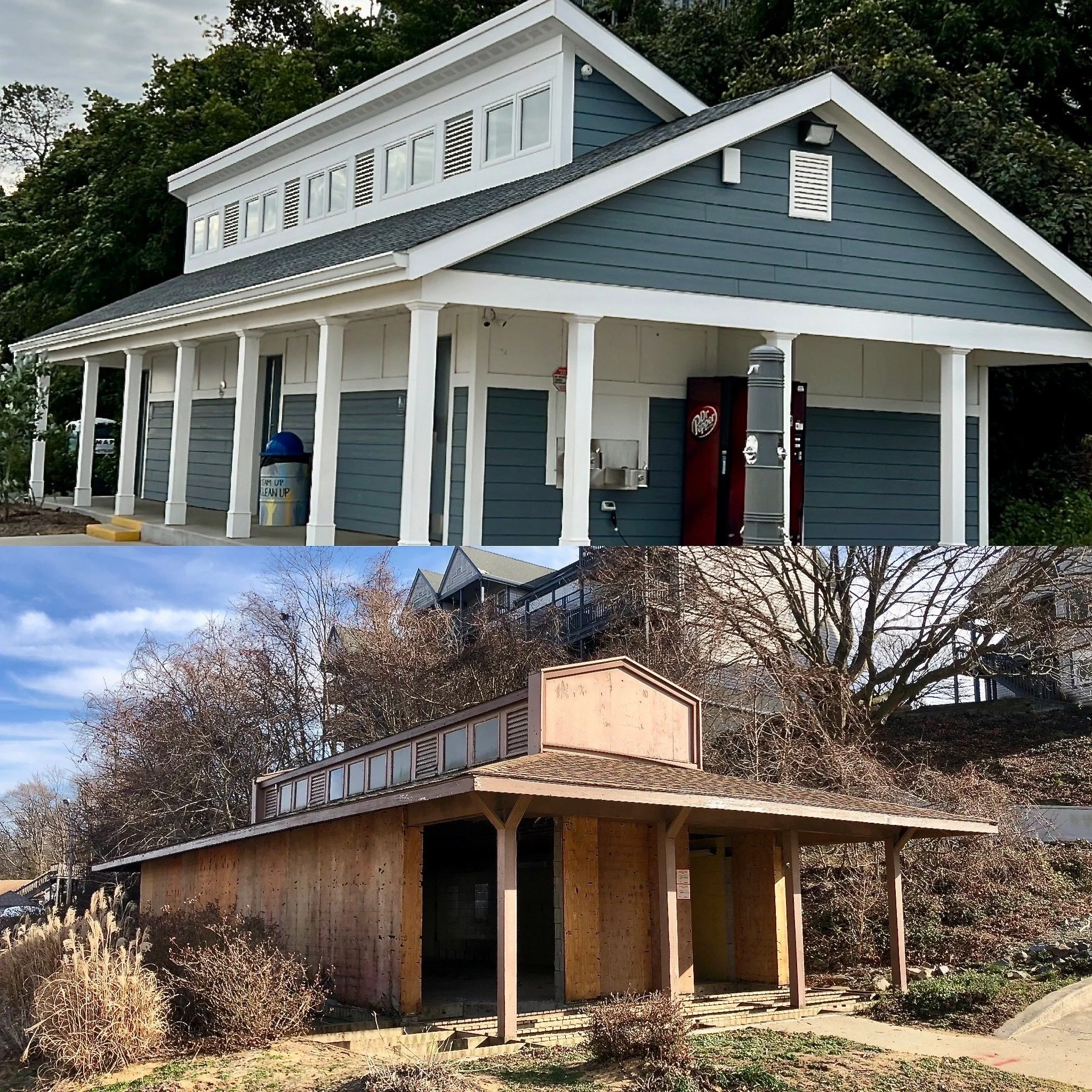RENOVATION VS NEW CONSTRUCTION
New construction vs. Remodeling. What to expect with either type of project
My early background in construction was framing new homes on new developments in the Washington metropolitan region. After the 2008 housing market collapse, I began to do more renovations and home additions. I learned pretty fast that these projects take longer, and they are a bit complex to achieve the client's goal.
In 2018 and 2019, my wife and I decided to renovate our own home with a new kitchen addition and a big covered patio in the back, connecting to the new kitchen. I knew from the beginning that we must modify part of the roof system to accommodate the new kitchen and patio. At the same time, I was building my detached garage/workshop, a small 22X30 garage with a studio on top. Doing all these new upgrades was fun but also very stressful. Everything began with good plans for each project, but sometimes it was hard to predict the outcome until we started to demo some walls and roof systems to make sure everything was going to work as we planned. Most of the new additions or home renovations have surprises behind walls and under the roof.
I believe that in some cases, it's better to do a new construction build. But I also like history and preserving the old classical craftsmanship from homes that were built a long time ago. By December of 2020, our home was completed, from the new kitchen addition to new windows and siding, outdoor patio, and a beautiful landscape in the front.
I laid out some contrasting variables in respect to preference and practicality, let us know what you think!
So you've either decided to enter the home ownership phase or the real estate investment phase of your life. What do you do with your first property or home? Do you remodel it or do you tear the entire house down to the ground and start from the drawing bored? Maybe you bought that old fixer upper in hopes of turning a profit in the short term. In the long term it may cost you more than a new construction build. Here are some differences that essentially dictate whether a new construction build or renovation might be more suitable to your needs.
A renovation build and a new construction build are two distinct types of construction projects. Here are the primary differences between them:
Scope:
A renovation build involves modifying or upgrading an existing structure, such as a house, building, or room. It focuses on improving or transforming the existing space without demolishing the entire structure.
On the other hand, a new construction build involves starting from scratch, where an entirely new building or structure is created on a vacant lot or by demolishing an existing structure.
Design Considerations:
In a renovation build, the design process typically revolves around working with the existing layout, structure, and constraints of the building. The goal is to incorporate desired changes while adapting to the limitations posed by the existing framework.
In contrast, a new construction build allows for greater flexibility in design since there are no pre-existing structures or limitations to consider.
Building Codes and Permits:
Renovation builds often require adherence to specific building codes and regulations governing modifications to existing structures. These codes can dictate the extent of renovations, materials used, and safety requirements.
For new construction builds, there are generally more lenient code requirements since the construction is not tied to an existing structure.
Construction Process:
Renovation builds involve working within an existing space, which can present challenges such as demolition, structural modifications, and dealing with unexpected issues that arise during construction.
New construction builds, on the other hand, typically follow a more straightforward process, starting with site preparation, foundation construction, and then proceeding to erecting the new structure.
Cost and Time:
Renovation builds can be costlier and more time-consuming than new construction builds. Renovations often involve additional complexities, such as working around existing utilities, unforeseen structural issues, and the need for customization to blend new and existing elements.
New construction builds, while not immune to challenges, tend to have more predictable costs and timelines since they are built from the ground up.
Environmental Impact:
New construction builds can have a greater environmental impact due to the need for new materials and resources.
Renovation builds, especially those incorporating sustainable practices, can be more environmentally friendly by utilizing existing structures, reducing waste, and recycling materials.
Both renovation builds and new construction builds have their own advantages and considerations. The choice between the two depends on factors such as the condition of the existing structure, budget, desired design, and project goals.
Below are some of the additional variables that should be assessed in a new construction build or renovation project.
Condition and Age of the Existing Structure: Assess the current condition of the property. If the existing structure is in poor condition, requires extensive repairs, or has fundamental issues like a compromised foundation, it might be more cost-effective to opt for a new construction build. Renovating a severely deteriorated property can sometimes result in unforeseen expenses and ongoing maintenance costs.
Scope of Changes: Consider the extent of the changes you want to make. If you're looking to make significant modifications to the layout, expand the square footage, or change the building's function, a renovation may involve complex structural alterations and additional costs. In such cases, a new construction build might provide greater flexibility and cost efficiency.
Cost Estimations: Obtain detailed cost estimates for both renovation and new construction projects from reputable contractors or construction professionals. Ensure the estimates account for all the necessary aspects, including labor, materials, permits, architectural and engineering fees, demolition (if applicable), and any site preparation required for a new construction build. A thorough comparison of these estimates will help you evaluate the financial implications of each option.
Hidden Costs: Consider potential hidden costs associated with each option. Renovation builds can involve unexpected discoveries during the construction process, such as hidden structural issues or the need to update outdated electrical or plumbing systems. These unforeseen costs can significantly impact the total cost of a renovation project. New construction builds, while generally more predictable, may still have unforeseen expenses, such as soil remediation or unexpected permitting requirements.
Energy Efficiency: Assess the energy efficiency of the existing structure. Older buildings may lack modern insulation, energy-efficient windows, or HVAC systems, resulting in higher energy costs. If energy efficiency is a priority, a new construction build allows you to incorporate sustainable features and technologies more effectively, potentially reducing long-term operating expenses.
Future Market Value: Consider the potential impact on the property's market value. A well-executed renovation or new construction project can enhance the property's appeal and value. Research comparable properties in the area to gauge the potential market value after renovation or new construction. Consult with a real estate professional to assess the potential return on investment for both options.
Personal Preferences and Lifestyle: Consider your personal preferences, lifestyle needs, and long-term plans. Renovating an existing property allows you to retain the property's character, historical significance, or sentimental value. On the other hand, a new construction build provides the opportunity to design a custom space that precisely matches your requirements and preferences.
It's crucial to carefully evaluate all these factors and weigh the costs, benefits, and potential risks associated with each option. Consulting with professionals, such as contractors, architects, or real estate advisors, can provide valuable insights and help you make an informed decision on whether you would prefer to take on renovation or new construction project.
A new construction build can be more cost-effective and efficient compared to a renovation build in several ways:
Construction Efficiency: New construction builds typically follow a streamlined construction process, allowing for efficient scheduling and coordination of trades. Construction teams can work in a systematic manner without the constraints of existing structures or the need to accommodate ongoing operations. This efficiency can result in shorter construction timelines, reduced labor costs, and better overall project management.
Reduced Repairs and Maintenance: With a new construction build, all components of the structure, including the foundation, walls, roofing, electrical, plumbing, and HVAC systems, are brand new. This means that there is a reduced likelihood of immediate repairs or maintenance needs compared to an older building. In a renovation build, unforeseen repairs and maintenance issues in the existing structure can increase costs and cause project delays.
Energy Efficiency and Cost Savings: New construction allows for the integration of the latest energy-efficient technologies and building practices. Energy-efficient insulation, windows, lighting systems, and HVAC systems can be designed and installed from the start, resulting in reduced energy consumption and lower utility bills over the lifespan of the building. Additionally, incorporating renewable energy sources, such as solar panels, during the new construction phase can further enhance energy efficiency and lead to long-term cost savings.
Design Optimization: With new construction, there is greater flexibility in designing the layout, functionality, and aesthetics of the building. This allows for optimal space utilization and the incorporation of modern design principles. By carefully considering factors like traffic flow, natural light, and spatial efficiency, a new construction build can be designed to maximize functionality and minimize wasted space, resulting in cost savings.
Lower Maintenance and Repair Costs: In a renovation build, existing structures may have hidden issues that require repairs or ongoing maintenance. Aging electrical systems, plumbing problems, or structural deficiencies may necessitate costly repairs or updates. With a new construction build, you start with a clean slate and can incorporate high-quality materials and systems that require minimal maintenance, reducing future repair costs.
Warranty Coverage: Many new construction builds come with warranties for the construction work and materials. These warranties provide added protection and can potentially save costs in the event of defects or failures. Renovation builds often lack the same level of warranty coverage, leaving the owner solely responsible for any repairs or issues that arise.
It's important to note that while new construction builds can offer cost-effective and efficient advantages, they also come with their own set of considerations and potential challenges. Thorough planning, budgeting, and working with experienced professionals are crucial to ensure a successful and cost-effective new construction project.

















